Spaceline News Archives
October 2020
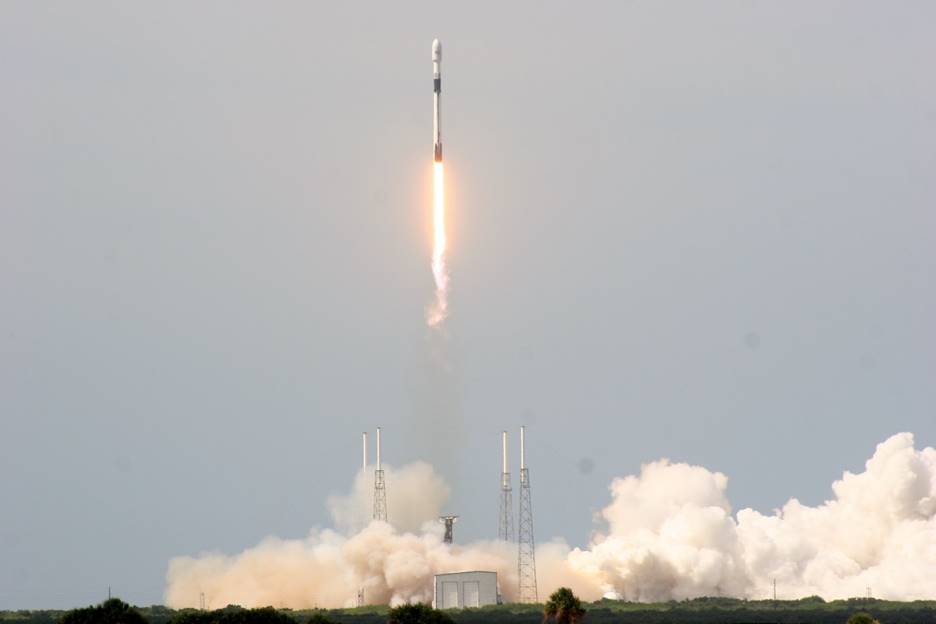
Falcon 9 Launch From Pad 40, File Photo Courtesy Liz Allen/Spaceline
Falcon 9 Launches More Starlink Satellites
October 24, 2020 | Reported by Cliff Lethbridge
A SpaceX Falcon 9 rocket successfully launched 60 Starlink broadband satellites at 11:31 a.m. EDT today from Launch Pad 40 on Cape Canaveral Air Force Station. Launch was originally scheduled for October 22, 2020 but was postponed due to a camera malfunction on the rocket's second stage. The first stage booster employed today was being flown for the third time, having previously supported the GPS III-SV03 mission in June, 2020 and a Starlink mission in September, 2020. The booster was successfully recovered today with a landing on the "Just Read the Instructions" drone ship positioned on the Atlantic Ocean about 400 miles northeast of Cape Canaveral. The mission, designated Starlink V1.0-L14, the fifteenth Starlink mission, carried 60 SpaceX-owned and operated broadband Internet satellites, bringing the total launched to date to 895, including two prototypes. The satellites were successfully deployed about an hour after launch. Starlink is a constellation of satellites designed to provide space-based Internet service to unserved areas throughout the world, or as an alternative to traditional Internet service. The service could be operational to the entire world in 2021.
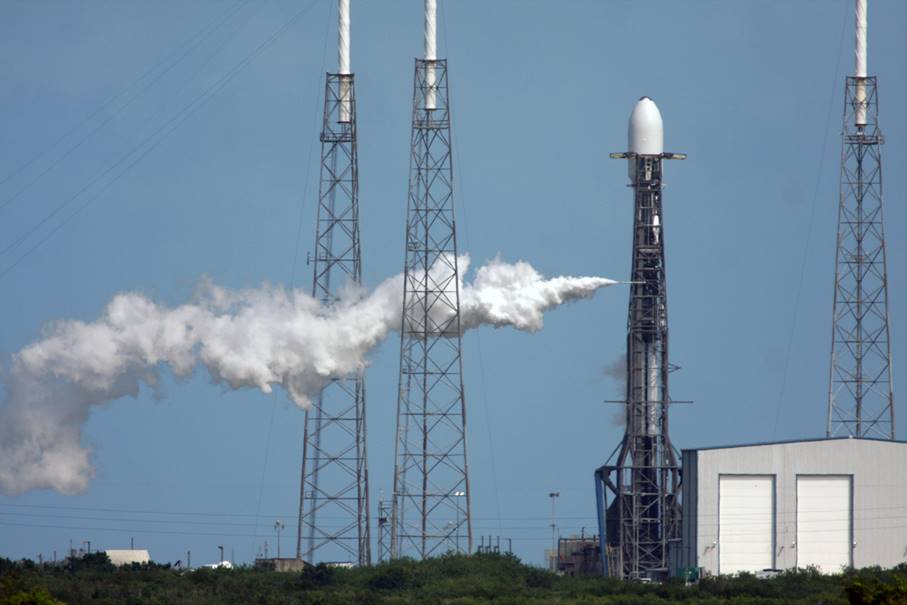
Falcon 9 Starlink V1.0-L14 On Launch Pad 40, Photo Courtesy Carleton Bailie/Spaceline
Falcon 9 Launch Scrubbed
October 22, 2020 | Reported by Cliff Lethbridge
Launch of a SpaceX Falcon 9 rocket scheduled for 12:14 p.m. EDT today on a mission designated Starlink V1.0-L14 has been scrubbed. A scrub was announced about 15 minutes prior to launch due to a "mission assurance" issue. The company issued a statement saying that the "mission assurance" issue was the failure of an upper stage camera and a decision was made to stand down from the launch attempt and check the entire vehicle to determine if there are any other issues outstanding. A new launch date has yet to be announced. The rocket will be launched from Launch Pad 40 on Cape Canaveral Air Force Station and will be carrying 60 Starlink broadband Internet satellites. This will be the fifteenth batch of Starlink satellites launched to date, part of a constellation of satellites designed to provide space-based Internet service to users around the world.
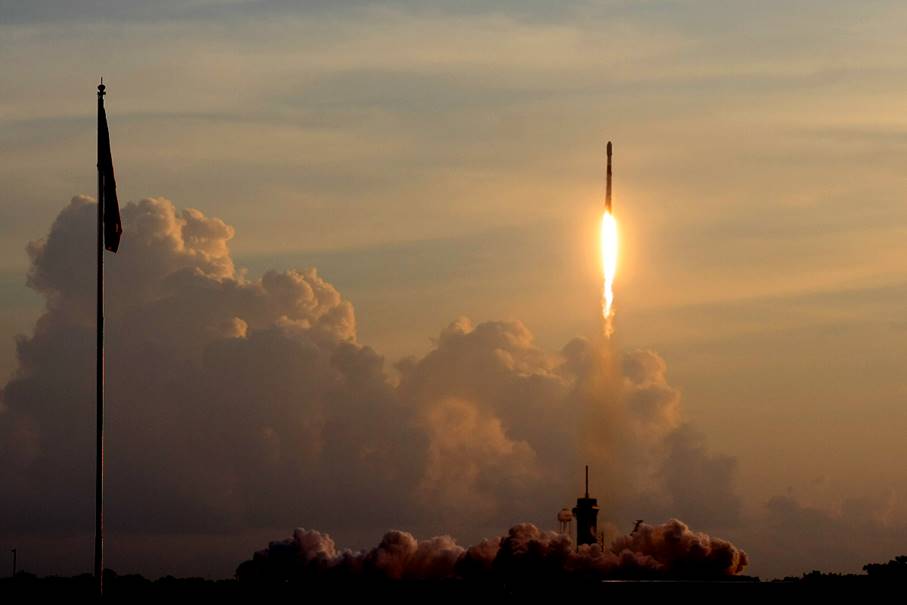
Falcon 9 Starlink V1.0-L13 Launch, Photo Courtesy Carleton Bailie, Spaceline
Falcon 9 Launches More Starlink Satellites
October 18, 2020 | Reported by Cliff Lethbridge
A SpaceX Falcon 9 rocket successfully launched 60 Starlink broadband satellites at 8:25 a.m. EDT today from Launch Pad 39A at the Kennedy Space Center. The mission, designated Starlink V1.0-L13, was the fourteenth flight in the Starlink series. The first stage booster employed today was being flown for the sixth time, having previously supported the unmanned Crew Dragon, RADARSAT and three Starlink missions. The booster was successfully recovered with a landing on the "Of Course I Still Love You" drone ship positioned on the Atlantic Ocean about 400 miles northeast of Cape Canaveral. The two payload fairing halves used today were also successfully caught on the "Ms. Tree" and "Ms. Chief" vessels. Each half was being flown for the third time.
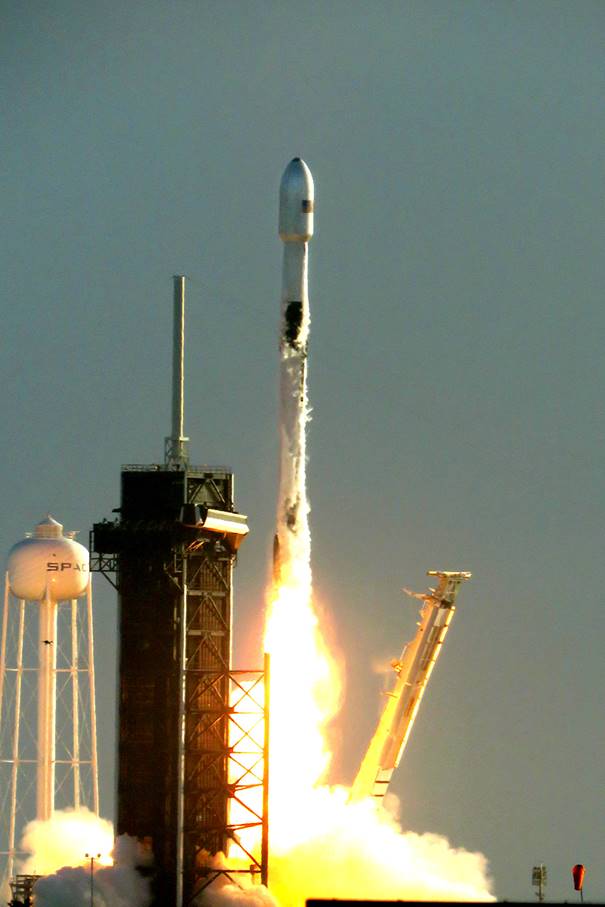
Falcon 9 Starlink V1.0-L13 Launch, Photo Courtesy Carleton Bailie/Spaceline
Today's launch brings to a total of 835 the number of Starlink satellites in orbit, including two prototype units. This is over half of the number SpaceX says they will need to begin offering their Starlink space-based broadband Internet service to the world. The company has been approved to launch an initial batch of 12,000 Starlink satellites, but has applied for permission to deploy an additional 30,000 more. The Starlink constellation is currently being vigorously tested and has been offered in locations where traditional Internet service is not available. These locations include an administrative center and 20 private homes in the Hoh Tribe Reservation as well as fire victims, both in the state of Washington. SpaceX says these tests and applications are going very well. The company may be launching its next batch of Starlink satellites as early as Wednesday, October 21.
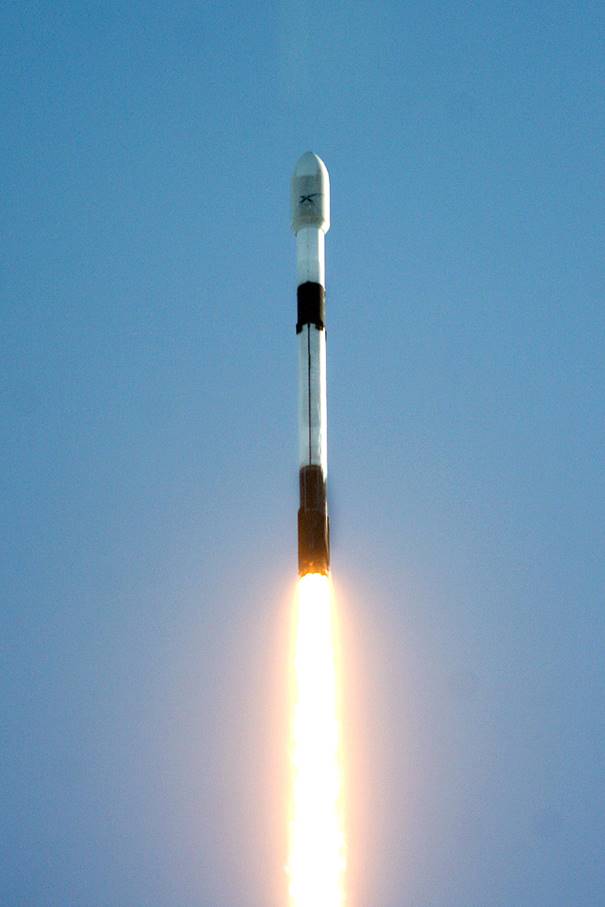
Falcon 9 Starlink V1.0-L13 Ascent, Photo Courtesy Carleton Bailie/Spaceline

Falcon 9 Starlink Launch, Photo Courtesy Liz Allen/Spaceline
Launch Drought Ends With Falcon 9 Success
October 6, 2020 | Reported by Cliff Lethbridge
The launch drought at Cape Canaveral is finally over as a SpaceX Falcon 9 rocket successfully launched 60 Starlink satellites at 7:29 a.m. EDT today from Launch Pad 39A at the Kennedy Space Center. The Cape has been plagued by a plethora of weather and technical scrubs since the last successful launch on September 3, 2020. In fact, this was the fifth launch attempt for this mission. The launch was scrubbed on September 17, 2020 due to bad weather in the booster recovery area, and on September 28, 2020 and October 5, 2020 due to bad weather on the Cape. The Falcon 9 rocket also suffered a launch pad abort at launch minus 18 seconds on October 1, 2020 due to a ground sensor problem.
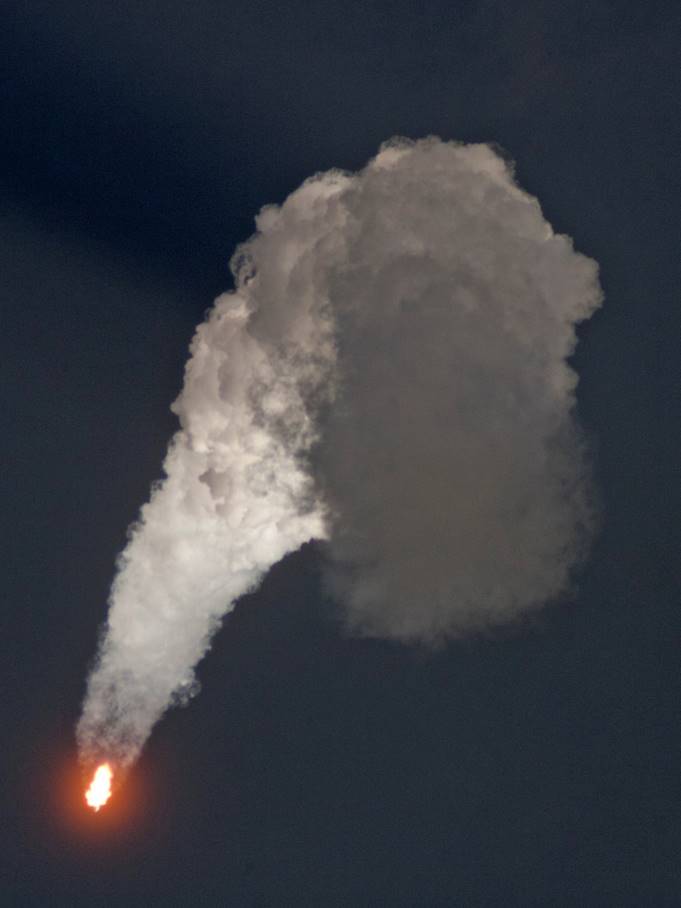
Falcon 9 Starlink Ascent, Photo Courtesy Liz Allen/Spaceline
The first stage booster employed today was successfully recovered with a landing on the "Of Course I Still Love You" drone ship positioned on the Atlantic Ocean about 400 miles northeast of Cape Canaveral. The booster was being flown for the third time, having previously supported the DM-2 and Anasis-II missions. Half of the rocket's payload fairing was caught by the "Ms. Tree" vessel. This payload fairing was recovered for the third time, having been used in two previous Starlink missions. No official word on the status of the second payload fairing half. The rocket carried the thirteenth batch of Starlink broadband Internet satellites, bringing the total in orbit to 773, not including two prototypes. That is roughly half of the number needed for SpaceX to begin worldwide, space-based broadband Internet service to the world.
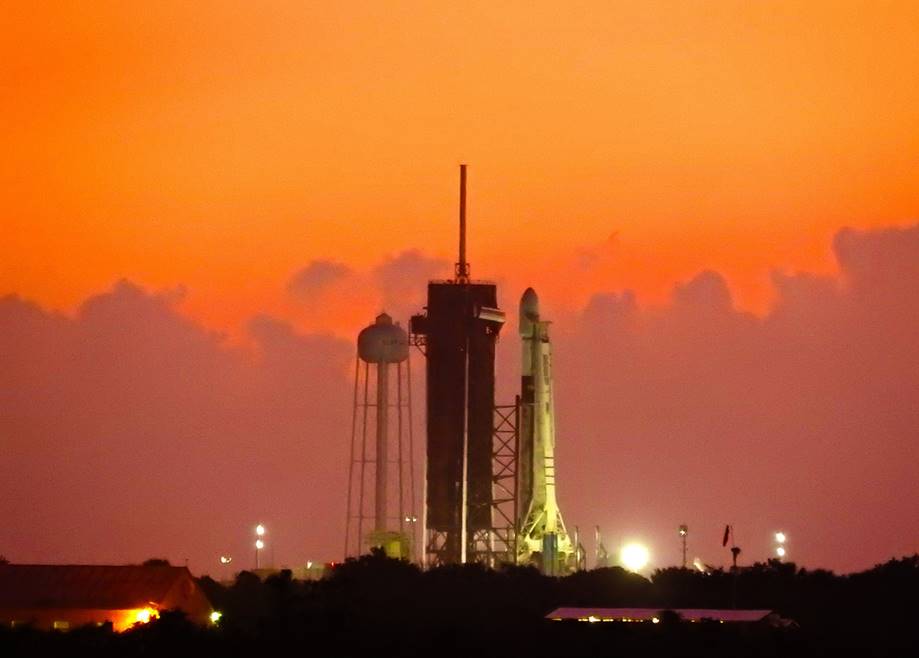
Falcon 9 Starlink At Sunrise, Photo Courtesy Liz Allen, Spaceline
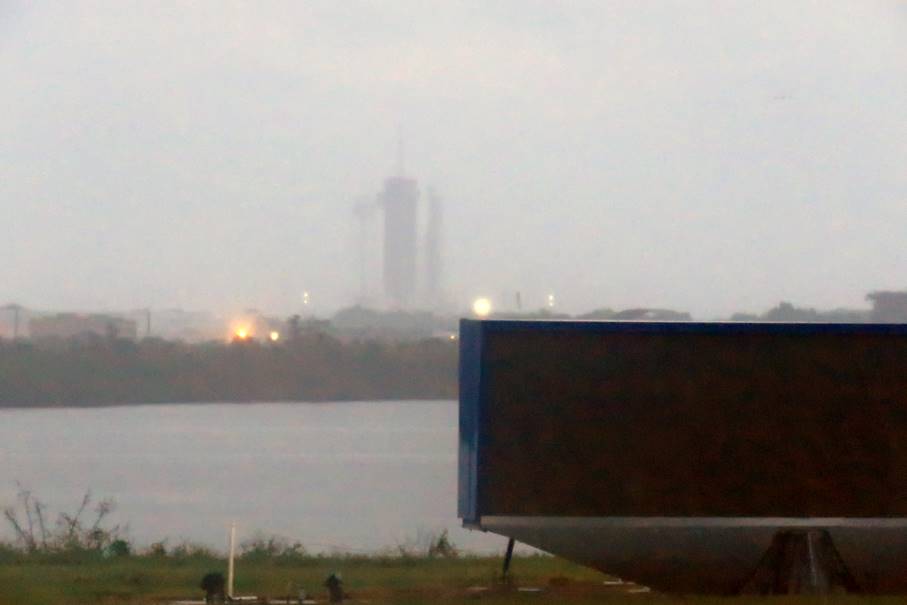
Clouds And Rain Obscure Launch Pad 39A, Photo Courtesy Carleton Bailie, Spaceline
Falcon 9 Launch Scrubbed Due To Bad Weather
October 5, 2020 | Reported by Cliff Lethbridge
Launch of a SpaceX Falcon 9 rocket scheduled for 7:51 a.m. EDT today has been scrubbed due to bad weather. Rain and clouds prevailed throughout the countdown and a scrub was officially called about 30 minutes prior to launch. Launch has been rescheduled for Tuesday, October 6, 2020 at 7:29 a.m. EDT. Launch will be from Launch Pad 39A at the Kennedy Space Center and the rocket will be carrying 60 SpaceX-owned Starlink broadband satellites. Today's scrub continues a plethora of launch delays for SpaceX and United Launch Alliance (ULA). There has not been a launch from the Cape since September 3, 2020 and pending ULA Delta IV Heavy (NROL-44) and SpaceX Falcon 9 (GPS III SV-04) launches have been postponed indefinitely due to technical issues.

Clouds And Rain Obscure Launch Pad 39A, Photo Courtesy Carleton Bailie, Spaceline
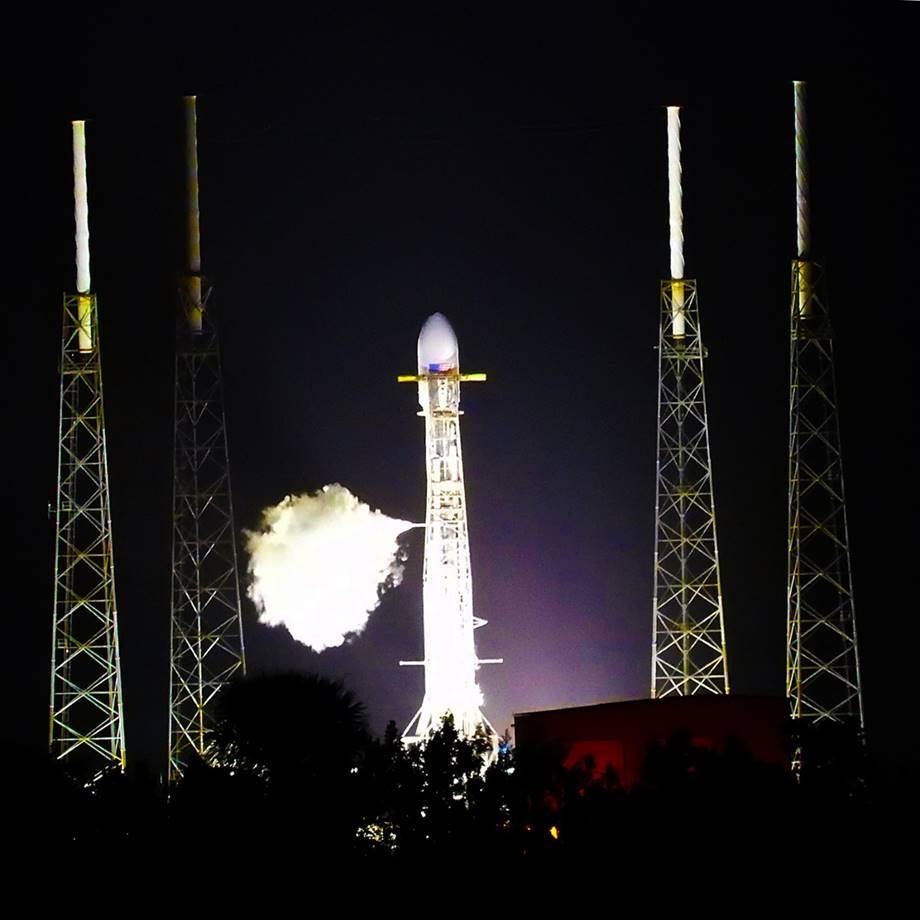
Falcon 9 GPS III SV-04 Launch Pad Abort, Photo Courtesy Liz Allen/Spaceline
Hard Luck Continues At Cape Canaveral With Falcon 9 Abort
October 2, 2020 | Reported by Cliff Lethbridge
Hard luck continues at Cape Canaveral with the launch pad abort of a SpaceX Falcon 9 rocket. Launch of the Falcon 9 was scheduled for 9:43 p.m. EDT today from Launch Pad 40 on Cape Canaveral Air Force Station but was aborted just two seconds before launch but before main engine ignition. This was the third launch pad abort on the Cape in just three days, following a Delta IV Heavy launch pad abort on September 30, 2020 and a separate Falcon 9 launch pad abort on October 1, 2020. There hasn't been a successful launch from the Cape since September 3, 2020. SpaceX said today's launch pad abort was caused by an "unexpected pressure rise in the turbomachinery gas generator", a device that helps control the operation of the Falcon 9's nine main engines. Launch has yet to be rescheduled. The Falcon 9 will be carrying the GPS III SV-04 Global Positioning System satellite for the U.S. military.
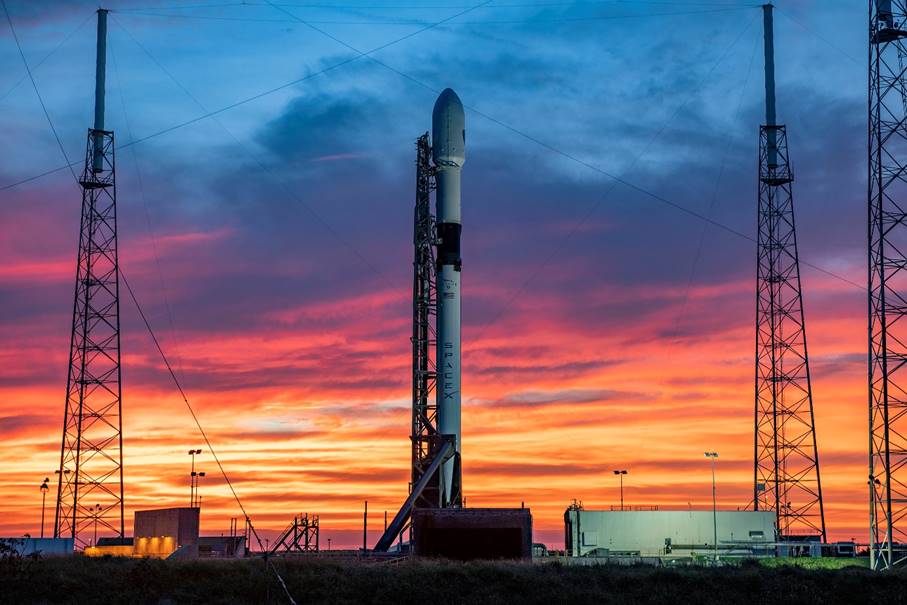
Falcon 9 GPS III SV-04 On Launch Pad 40, Photo Courtesy SpaceX
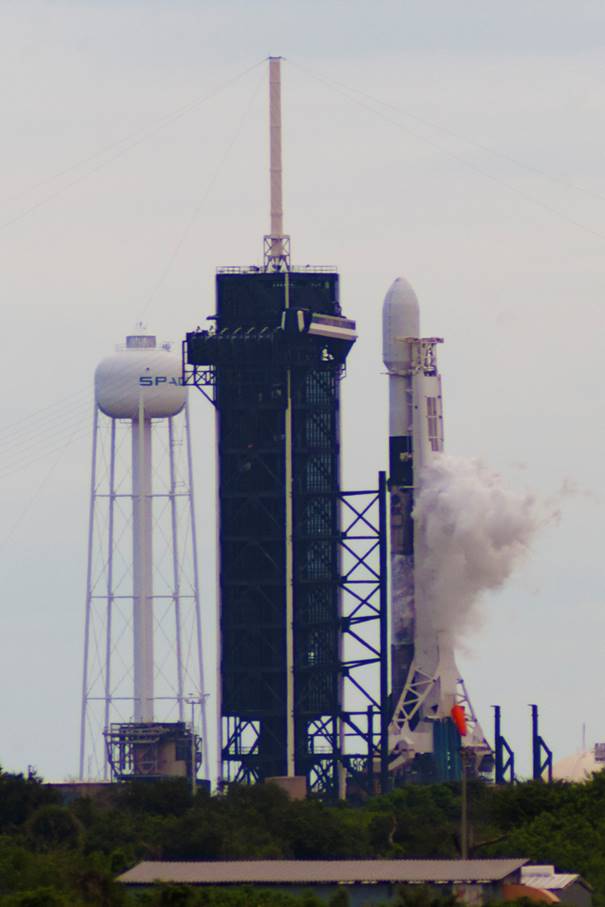
Falcon 9 Starlink Launch Pad Abort, Photo Courtesy Liz Allen/Spaceline
Delta IV Heavy/Falcon 9 Suffer Launch Pad Aborts
October 1, 2020 | Reported by Cliff Lethbridge
Both a United Launch Alliance (ULA) Delta IV Heavy rocket and a SpaceX Falcon 9 rocket have suffered launch pad aborts less than ten hours apart. The Delta IV Heavy rocket was scheduled for launch at 11:54 p.m. EDT on September 30, 2020 while the Falcon 9 rocket was scheduled for launch at 9:17 a.m. EDT today. Both rockets have been plagued by lengthy delays due to a number of technical and weather issues. The Delta IV Heavy also suffered a dramatic launch pad abort after main engine ignition on August 29, 2020. Last night's Delta IV Heavy abort was initiated seven seconds before launch and before main engine ignition. In a press release, ULA said that the abort was triggered when the terminal countdown sequencer rack (TCSR) detected an unexpected condition. The TCSR controls the launch beginning at launch minus 10 seconds. The company said the launch team is currently reviewing data to determine a path forward. The launch has not yet been rescheduled. Launch will be from Launch Pad 37B on Cape Canaveral Air Force Station and the rocket will carry NROL-44, a classified payload for the National Reconnaissance Office. SpaceX said that the Falcon 9 launch pad abort, which occurred at launch minus 18 seconds and before main engine ignition, was triggered by an unexpected ground sensor reading. Launch has yet to be officially rescheduled. The Falcon 9 will launch from Launch Pad 39A at the Kennedy Space Center carrying 60 Starlink broadband Internet satellites.
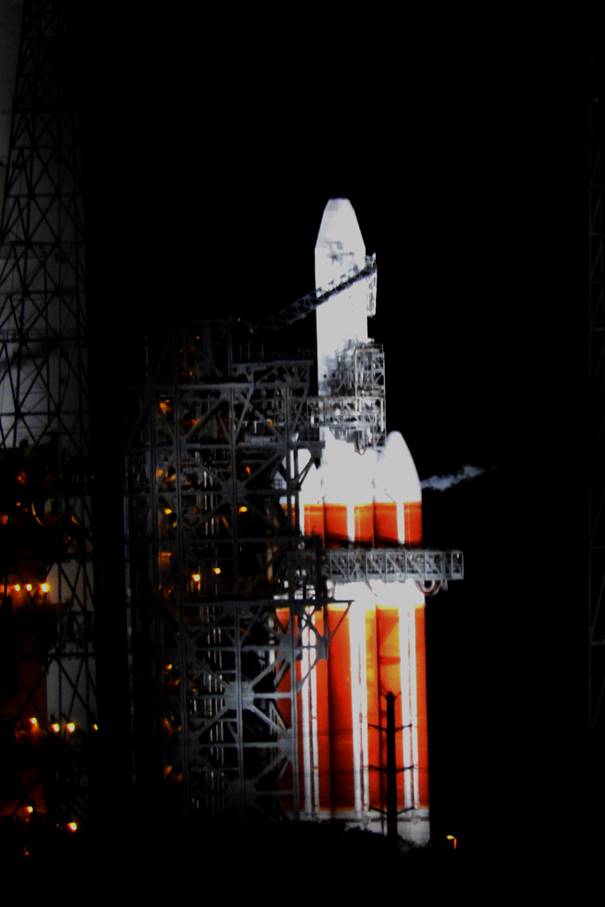
Delta IV Heavy NROL-44 Launch Pad Abort, Photo Courtesy Liz Allen/Spaceline















